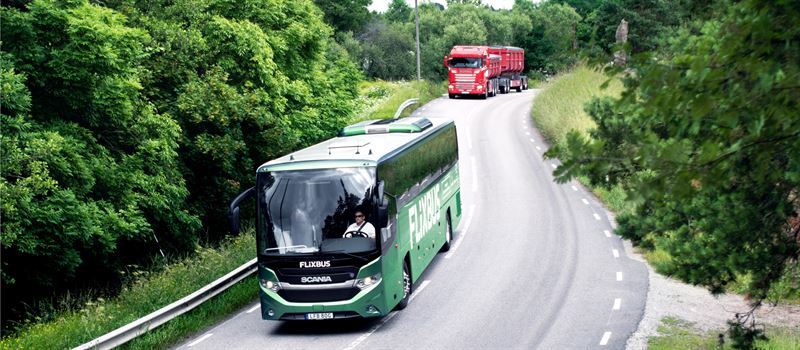Premiere for the first international biogas bus

• In a collaboration between Scania, mobility provider Flixbus and gas supplier Gasum, the first long distance coach running on biogas will operate the Stockholm-Oslo route.
• Powered by liquid biogas (LBG), the coach will reduce climate impact and contribute to a fossil-free transport between the two Nordic capitals.
Biogas is currently used in compressed form mainly by city buses, cars and light transport vehicles, but has so far been less competitive for heavy long-distance vehicles. In recent years, technology has been developed to cool the biogas to around minus 160 degrees Celsius so that it becomes liquid and thus more energy-dense. This opens up the possibility of using the gas for, among other things, heavy transport, both by land and by sea.
Availability of biogas will improve quickly throughout Europe, especially as the EU decided to make fuelling points available along main European road networks (TEN-T).
“As the first long distance coach powered by biogas, this is probably the most sustainable coach solution today,” says Johan Ekberg, Head of Scania´s Customer Unit.
The benefits of liquid biogas are many: it`s fossil-free, renewable, locally produced and reduces emissions. By switching to locally produced liquid biogas as fuel in long-distance trucks or buses, operators reduce both their own and their customers' climate impact by more than 90 percent. Air quality in general is also positively affected by reduced emissions of particles and nitrogen oxides (NOx), and the quieter vehicles benefits both drivers and passengers, and the society at large.
“Biogas is not only the fuel with the lowest CO2 emissions – it also solves local waste problems, creates local jobs and brings carbon and nutrients back to the soil. It is the Swiss Army Knife of circular economy,” says Jonas Strömberg, Sustainability Director at Scania.
Already today, 17 percent of Europe’s gas grid is biogas, and it´s rising rapidly, actively contributing to CO2 emission cuts. In Sweden´s vehicle gas grid the biogas share is a staggering 95%.
“Biogas will be one of the key tools for decarbonisation of heavy duty transport – especially for long distance operations like intercity and long-haulage. Half of Europe’s heavy duty gas fleet could be powered by biogas in 2025,” Jonas Strömberg concludes.
For further information, please contact:
Johan Ekberg, Head of Customer Unit, Scania Buses & Coaches
Phone: +46 70 081 09 45
E-mail: johan.ekberg@scania.com
Jonas Strömberg, Sustainability Director, Scania Sustainable Transport Solutions
Phone: +46 70 787 27 11
E-mail: jonas.stromberg@scania.com
Scania is a world-leading provider of transport solutions. Together with our partners and customers we are driving the shift towards a sustainable transport system. In 2020, we delivered 66,900 trucks, 5,200 buses as well as 11,000 industrial and marine power systems to our customers. Net sales totalled to over SEK 125 billion, of which over 20 percent were services-related. Founded in 1891, Scania now operates in more than 100 countries and employs some 50,000 people. Research and development are mainly concentrated in Sweden. Production takes place in Europe and Latin America with regional product centres in Africa, Asia and Eurasia. Scania is part of TRATON GROUP. For more information visit: www.scania.com.



